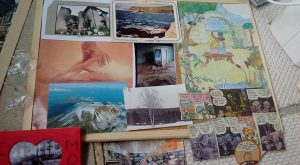Tomorrow We Will Run Faster…
Above anything else we are curators of people’s responses to us. I have a fine collection of reactions British people make when they learn I’m American. Students I worked with focused on food: ‘Do you like peanut butter then, Miss? Did you eat MacDonalds every day? Do you always have pancakes for breakfast?’
Adults generally look for the story: ‘What brings you here, then?’ It’s similar to the question I sometimes get asked at work when people find I’m a writer, as if there are certain boxes Americans and writers must fit in, and somehow I’m not in them.
But for writers, people most want to know if we’re successful. Have you found that? As with the kids asking about food, adults ask about the money. ‘So have you been published? Going to be as rich as JK Rowling?’
They’re not interested in what a story’s about, so long as they have a tangible way to compare our successes.
Nothing wrong with that; we totally do that to ourselves, especially at the end of another year. What have we got to show for it? How are we measuring up?
Before such introspection runs amok, I’m trying to tether my self-assessment to specific criteria (you can tell I’ve survived a few OFSTED inspections). Here they are, as reminders that it’s not all about money and publication:
Did we start new projects?
I ran with a few different ideas this year, from a Dissatisfied Relatively Privileged Middle Aged Person story (one could argue that pretty much defines contemporary literature), to a dystopian short story about detention camps for anyone foreign-born. I have two novel concepts to plot and write, and other unfinished bits and bobs, mostly in the literary genre but some historical and even science fiction. I’ll move further with these in the new year, but I’m glad I haven’t finished everything; it’s nice to start afresh with a few already-begun stories kicking around.

Did we maintain (or, let’s be honest, start) good habits?
After getting some fantastic Twitter motivation a few weeks ago in a discussion about keeping the imagination fresh, I started getting up even earlier in the morning so I could scribble for fifteen minutes before my daily hike. By the end of the second week, branches of a new novel shot through my brain. Fifteen or even ten minutes without stopping can yield two or three notebook pages. If, like me, your will to write has dwindled while life is busy, try writing a little every day. Before you know it, you’ll be hooked again and you will find more time, because you’ll be hungry for it.
Did we explore new sources of motivation?
I discovered Writers HQ this year, and went to one of their workshops. This fabulous organisation, while never glossing over how hard writing can be, encourages participants relentlessly and ensures you keep going. I definitely will be using their services more in 2018, and I recommend checking out their website, if just for a giggle at their cheekiness.
Every year I seem to discover a new anthem to get me psyched to create. In 2017 it was pretty much the whole soundtrack of Hamilton. ‘I wrote my way out of Hell…I was louder than the crack in the bell.’ The crannies where we write are The Room Where It Happens, people.
Did we cultivate wonder?
We writers often find ourselves serving as essential conduits for the

suffering of the world. Sometimes it’s up to us to draw attention to it, and we risk getting cynical (even the Relatively Privileged Middle Aged among us). We can’t let negativity taint our writing. Whether it’s climbing a mountain, absorbing the camaraderie that develops among strangers on a bus commute, or revelling in a fellow writer’s impromptu recitation of Tennyson, we must remind ourselves of the beauty in the world.
Did we take in lots of voices?
This year I loved broadening my reading list following Women’s Writer School discussions on Women in Translation month and LGBTQ writers. Listening to panels on diversity at various literature festivals introduced me to the work of Reni Eddo-Lodge and Jess Hiles, as well as sign language poetry. I look forward to learning more, and supporting more diverse writers by purchasing their work in 2018. For anyone else interested, this reading challenge checklist from the Reading Women discussion group on Goodreads looks amazing.
Did we gulp our pride down and send our work into the world?
This might be the hardest part. I had a few successes this year—winning the Gloucestershire Writers Network prose prize and reading my story at the Cheltenham Literature Festival was a highlight—but with it have come a number of rejections as well.
And I’m proud of those rejections. I’m proud of the courage they represent. Rejections test us, tempt us to give up—but I’m certainly not going to, and I hope none of you will either.
How many people can do what we do? How many can haul an entire novel out of a brain already taxed by work, family, chores, life—and then ceaselessly chisel and gouge that vast, beloved creative work into something even better? How many can bravely place their art before the world, pace through weeks or months awaiting the results, only to meet with utter disappointment? And how many, after all that, will do the whole thing again—and again?
We are amazing.
You may recognise the quote in this post’s subtitle, from the end of The Great Gatsby. ‘It eluded us then, but that’s no matter–tomorrow we will run faster, stretch out our arms farther… And one fine morning– So we beat on, boats against the current…’
I’m using it because of a passage in another book which quotes it, The Hotel New Hampshire by John Irving. The young writer character in this book says, ‘There’s no point in writing a book if you don’t think it can be as good as The Great Gatsby. I mean, it’s all right if you fail—if the finished book just isn’t, somehow, very good—but you have to believe it can be very good before you start.’
Writing, and any artistic pursuit, demand we surround ourselves with a supportive network that fortifies our hearts to believe, while feeding our minds to expand so our self-belief will not be unfounded. This checklist is designed to maintain that balance. Have you got anything to add?







